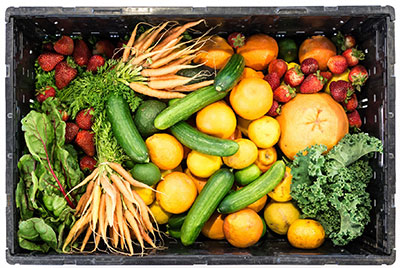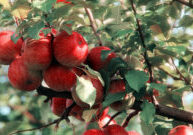Oral Allergy Syndrome
 For people with seasonal pollen allergies, eating fresh fruits and vegetables such as apples, melons, celery, carrots, peanuts and some nuts can cause occasional mouth and throat itching. This is referred to as Oral Allergy Syndrome (also known as Pollen Food Allergy Syndrome).
For people with seasonal pollen allergies, eating fresh fruits and vegetables such as apples, melons, celery, carrots, peanuts and some nuts can cause occasional mouth and throat itching. This is referred to as Oral Allergy Syndrome (also known as Pollen Food Allergy Syndrome).
Pollen and the related foods which may cause symptoms
- Birch
- Apple
- Carrot
- Celery
- Cherry
- Peach
- Apricot
- Pear
- Potato
- Hazelnut
- Peanut
- Ragweed
- Cantaloupe and other melons
- Banana
- Zucchini
- Mango
- Milk
- Mint
- Lettuce
- Cucumber
- Grass
- Legumes (peas, beans, soybeans, all beans such as kidney, navy, garbanzo, etc.)
- Grains
- Apple
- Carrot
- Celery
- Orange
- Tomato
- White potato
- Zucchini
- Cedar
- Apple
- Cherry
- Bell peppers
- Kiwi
- Paprika
- Tomato
- Mugwort
- Broccoli
- Cantaloupe
- Carrot
- Celery
- Mustard
- Peanut
- Sage
- Rosemary
- Garlic
- Onion
Compounds in certain foods are similar to compounds on the surface of pollen grains, and they can trigger mouth and throat itching among sensitized people. Many compounds are concentrated near fruit skins, so a peeled apple may cause fewer symptoms than the unpeeled fruit.
Some food allergens degrade with cooking, so apple sauce may cause fewer symptoms than fresh apples; cooked carrots may cause fewer symptoms than raw. Those on stomach acid blocking medications may experience more gastrointestinal symptoms, as these medications alter gastric digestion.
Oral allergy syndrome symptoms include:
- Itchy mouth and/or throat
- Gastrointestinal symptoms such as:
- Vomiting
- Diarrhea
- Abdominal pain
- Itchy eyes and/or nose
- Congested or runny nose
It is rare to develop throat swelling, hives or anaphylaxis due to oral allergy syndrome.
Oral allergy syndrome most often begins with a pollen allergy such as birch, ragweed or grass. Oral symptoms are seen among 70% of birch sensitive patients, and an allergy to particular foods may follow.
How can I treat my oral allergy syndrome?
- Limit the amount and frequency of symptom-causing foods, especially during peak allergy seasons
- Spring for birch
- Summer for grass
- Fall for ragweed
- Use oral antihistamines to control symptoms temporarily
- Treat the underlying allergy with allergy drops (sublingual immunotherapy)









